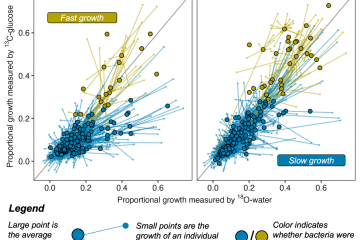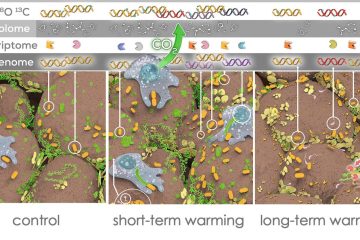Glucose triggers strong taxon-specific responses in microbial growth and activity: insights from DNA and RNA qSIP
Growth of soil microorganisms is often described as carbon limited, and adding labile carbon to soil often results in a transient and large increase in respiration. In contrast, soil microbial biomass changes little, suggesting that growth and respiration are decoupled in response to a carbon pulse. Alternatively, measuring bulk responses of the entire community (total respiration and biomass) could mask ecologically important variation among taxa in response to the added carbon. Here, we assessed taxon-specific variation in cellular growth (measured as DNA synthesis) and metabolic activity (measured as rRNA synthesis) following glucose addition to soil using quantitative stable isotope probing with H218O. We found that glucose addition altered rates of DNA and rRNA synthesis, but the effects were strongly taxon specific: glucose stimulated growth and rRNA transcription for some taxa, and suppressed these for others. These contrasting taxon-specific responses could explain the small and transient changes in total soil microbial biomass. Responses to glucose were not well predicted by a priori assignments of taxa into copiotrophic or oligotrophic categories. Across all taxa, rates of DNA and rRNA synthesis changed in parallel, indicating that growth and activity were coupled, and the degree of coupling was unaffected by glucose addition. This pattern argues against the idea that labile carbon addition causes a large reduction in metabolic growth efficiency; rather, the large pulse of respiration observed with labile substrate addition is more likely to be the result of rapid turnover of microbial biomass, possibly due to trophic interactions. Our results support a strong connection between rRNA synthesis and bacterial growth, and indicate that taxon-specific responses among soil bacteria can buffer responses at the scale of the whole community.


